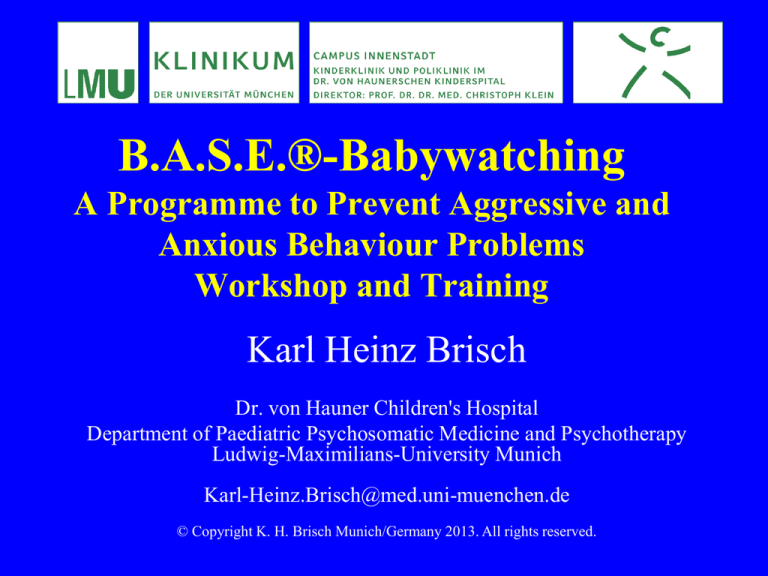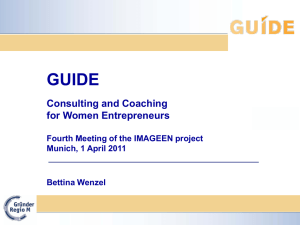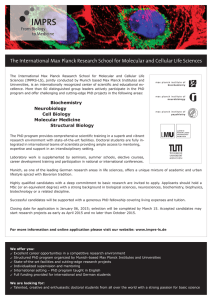
B.A.S.E.®-Babywatching
A Programme to Prevent Aggressive and
Anxious Behaviour Problems
Workshop and Training
Karl Heinz Brisch
Dr. von Hauner Children's Hospital
Department of Paediatric Psychosomatic Medicine and Psychotherapy
Ludwig-Maximilians-University Munich
Karl-Heinz.Brisch@med.uni-muenchen.de
© Copyright K. H. Brisch Munich/Germany 2013. All rights reserved.
Homepage
www.khbrisch.de/en
• Downloads
– Slides of presentation – BASE_GL_London
• www.base-babywatching-uk.org
• www.base-babywathing.de
• www.base-babywatching-frankfurt.de
© Copyright K. H. Brisch Munich/Germany 2013. All rights reserved.
B.A.S.E.
®
Babywatching
Karl Heinz Brisch
Kinderklinik und Kinderpoliklinik
im Dr. von Haunerschen Kinderspital
Abteilung Pädiatrische Psychosomatik und Psychotherapie
Ludwig-Maximilians-Universität München
B
A
S
E
= Babywatching
= Against Aggression and Anxiety
= For Sensitivity
= For Empathy
www.base-babywatching-uk.org
www.base-babywathing.de
© Copyright
K. H. Brisch Munich/Germany 2013. All rights reserved.
www.base-babywatching-frankfurt.de
Babywatching in Kindergarten and
schools
Overview
•
•
•
•
•
•
•
Theoretical background
Programme
Training by video and life observation
Results from research to date
Costs
Further perspectives
Roots of Empathy
© Copyright K. H. Brisch Munich/Germany 2013. All rights reserved.
Henri Parens – A Pioneer
• Healing from the Holocaust
• Autobiographie
© Copyright K. H. Brisch Munich/Germany 2013. All rights reserved.
Aggression theory according to
Henri Parens I
• Types of aggression
- Positive healthy aggression as „exploration“
- Negative hostile aggression against others
© Copyright K. H. Brisch Munich/Germany 2013. All rights reserved.
Aggression theory according to
Henri Parens II
• Cause of hostility
- Massive rejection and disregard of basic needs
of the child by caregivers
- Missing empathy in thoughts, feelings and
actions of children
© Copyright K. H. Brisch Munich/Germany 2013. All rights reserved.
Prevention programme
• Goals
- Ability for empathy
- Preventing hostility
• Modules for pupils and teachers
- From Kindergarten to grade 12 or 13
- Significant reduction of aggressive
behaviour in comparison to control groups
© Copyright K. H. Brisch Munich/Germany 2013. All rights reserved.
Kindergarten Programme
Baby-watching I
• Groups of children watching an infant in
interaction with his/her mother/father
• Starting shortly after birth till approx. end of
first year
• Up to autonomous walking and first words
© Copyright K. H. Brisch Munich/Germany 2013. All rights reserved.
Kindergarten Programme
Baby-watching II
• Instruction for Baby-watching by educators
• One educator leads the group, while another
leads the watching
• Monitoring of protocol
• Frequency
- 1 x weekly
- Circle of chairs
- Duration approx. 20-30 minutes
© Copyright K. H. Brisch Munich/Germany 2013. All rights reserved.
Training of empathy
• Sensitivity for other people‘s
–
–
–
–
Thoughts
Actions
Motivations
Feelings and emotions
• Selfereflective capacity of mentalizing
– „I think that you think that I think…“
– „I feel that you feel that I feel…“
© Copyright K. H. Brisch Munich/Germany 2013. All rights reserved.
Sensitivity (1)
• The caregiver with the highest sensitivity
during interaction will become the infant‘s
major attachment person.
• A high parental sensitivity will enhance the
development of a secure attachment of the
infant.
© Copyright K. H. Brisch Munich/Germany 2013. All rights reserved.
Sensitivity (2)
• The caregiver has to
– perceive the infant’s signals
– interpret correctly the infant’s signals
– react properly
– react promptly
to the infant‘s signals
© Copyright K. H. Brisch Munich/Germany 2013. All rights reserved.
Gaze
• Reciprocal gaze with affect attunement
between infant and caregiver promotes
secure attachment (intersubjectivity)
© Copyright K. H. Brisch Munich/Germany 2013. All rights reserved.
Verbal Interaction
• Support of secure attachment
by verbalization
– of the „inner world“ of affective situations
– of the infant‘s action context
© Copyright K. H. Brisch Munich/Germany 2013. All rights reserved.
Rhythm of interaction
in action and language
• Support of secure attachment by
– reciprocal change in mother-infant-interaction
and communication
– correction of mismatches
• insecure attachment
– via hyper-synchronous interaction and
communication
– absolutely asynchronous interaction
© Copyright K. H. Brisch Munich/Germany 2013. All rights reserved.
Touch
• Sensitive touch/massage between infant and
caregiver promotes secure attachment
• Hormon oxytocin
© Copyright K. H. Brisch Munich/Germany 2013. All rights reserved.
Levels of babywatching
•
•
•
•
•
Behavior
Motivation
Emotion
Identification
Empathy
© Copyright K. H. Brisch Munich/Germany 2013. All rights reserved.
Level of babywatching I
• Level of behavior
– What does the baby do?
– What does the mother/the father do?
© Copyright K. H. Brisch Munich/Germany 2013. All rights reserved.
Level of babywatching II
• Level of motivation
– Why does the baby behave in this way?
– Why does the mother/the father behave in this
way?
© Copyright K. H. Brisch Munich/Germany 2013. All rights reserved.
Level of babywatching III
• Level of emotions
– How does the baby feel in this situation?
– How does the mother/the father feel in this
situation?
© Copyright K. H. Brisch Munich/Germany 2013. All rights reserved.
Level of babywatching IV
• Level of identification with behavior
– What would I do in this situation, if I am the
baby?
– What would I do in this situation, if I am the
mother/the father?
© Copyright K. H. Brisch Munich/Germany 2013. All rights reserved.
Level of babywatching V
• Level of identification with emotions –
level of empathy
– How would I feel in this situation, if I am the
baby?
– How would I feel in this situation, if I am the
mother/the father?
© Copyright K. H. Brisch Munich/Germany 2013. All rights reserved.
Pitfall and failures
•
•
•
•
•
•
•
No programme of developmental psychology
No teaching with blackboard
No teacher – caring for baby
No student – touching, holding, cudling the baby
No focus on baby only and developmental steps
BUT always:
Focus is on mother/father-infant-interactions
© Copyright K. H. Brisch Munich/Germany 2013. All rights reserved.
Results Kindergarten I
• RTC-Study
• Behaviour assessment of the children
(N=50, age M=50 months) by
- Educators
- Parents
- Test at start and finish of intervention
- Comparison between control group (without
intervention) and intervention group
© Copyright K. H. Brisch Munich/Germany 2013. All rights reserved.
Results II
• Improvements in the intervention group
- Assessed by educators (CBCL)
• Boys
-
Less aggressive behaviour
Less oppositional behaviour
Improved alertness
Less social withdrawal
More emotional reactivity
Less „anxious-depressed“
© Copyright K. H. Brisch Munich/Germany 2013. All rights reserved.
Results III
• Improvements in the intervention group
- Assessed by educators (CBCL)
• Girls
-
Fewer physical complaints
Improved alertness
Less social withdrawal
More emotional reactivity
Less „anxious-depressed“
© Copyright K. H. Brisch Munich/Germany 2013. All rights reserved.
Results IV
• Improvements in the intervention group
- Assessed by parents (CBCL)
• Boys
-
Less aggressive behaviour
Improved alertness
Less social withdrawal
More emotional reactivity
© Copyright K. H. Brisch Munich/Germany 2013. All rights reserved.
Results V
• Improvements in the intervention group
- Assessed by parents (CBCL)
• Girls
-
less sleeping problems
Improved alertness
Less social withdrawal
More emotional reactivity
© Copyright K. H. Brisch Munich/Germany 2013. All rights reserved.
Results VI
• Additional improvements in the
intervention group
• Assessed by educators
- Attachment behaviours
- Looking for comfort from caregiver
- Applying the method of baby watching and
sensitivity of play with one another
© Copyright K. H. Brisch Munich/Germany 2013. All rights reserved.
BASE-School
• RCT Studie (Haneder, 2011)
• N=250 students, Tyrol/Austria primary
schools (N=123 in intervention-groups,
N=127 in control-groups)
• Strengths and Difficulties Questionnaire
• Pre-Post-Intervention
• Duration of intervention: 9 month
© Copyright K. H. Brisch Munich/Germany 2013. All rights reserved.
Results: Parents and Teachers
• Significant improvements in interventiongroups
– Emotional problems
– Prosocial behavior
– Total index of behavior problems
© Copyright K. H. Brisch Munich/Germany 2013. All rights reserved.
Improvement
Emotional behavior problems
•
•
•
•
•
Anxious-depressive
Withdrawal
Somatoforme complaints
Sleep-problems
Anxiety disorders
© Copyright K. H. Brisch Munich/Germany 2013. All rights reserved.
Improvement
Prosocial behavior
• Empathy in behavior
• Social competence
© Copyright K. H. Brisch Munich/Germany 2013. All rights reserved.
Improvement
Externalizing behavior
•
•
•
•
Aggression
Attention deficit
Oppositional behavior
Hyperactivity
© Copyright K. H. Brisch Munich/Germany 2013. All rights reserved.
Improvement
Global index of behavior problems
•
•
•
•
Aggression
Hyperactivity
Emotional problems
Problems in interactions with peers
© Copyright K. H. Brisch Munich/Germany 2013. All rights reserved.
Summary
• Overall positive effects for both boys and
girls
• Positive changes of externalising and
internalising disturbances
• Similar positive assessments made by
educators and parents
© Copyright K. H. Brisch Munich/Germany 2013. All rights reserved.
Summary II
• For all involved, an emotionally positive
experience
• Noticeable generalisation of the mode of
baby-watching during play with one another
• Preventive intervention at minimal cost
© Copyright K. H. Brisch Munich/Germany 2013. All rights reserved.
Outlook
• More widespread introduction and testing of
programme
• Testing in social areas with high risk
families
• Testing in other age groups
• Follow-up programme
© Copyright K. H. Brisch Munich/Germany 2013. All rights reserved.
Costs of B.A.S.E.® -Training
• BASE-Group-Leader
– One day training of kindergarten or school teacher –
approx. 50 Euros/person
• Supervision by BASE-Mentor
– One day training for Group-Leaders –
approx.120 Euros/person
– Individual prize for supervision
• BASE-Trainer
– In progress: 2 day training - approx 200 Euros/person
© Copyright K. H. Brisch Munich/Germany 2013. All rights reserved.
Costs of running B.A.S.E.® - courses
in kindergarten and schools
• NONE
– For teacher
– For institution
– For parents
• Cost for supervision
– Recommendation: Mentoring/supervision by BASE-Mentor –costs
depending on contract
– Video supervised by mentor
• Mother and baby are not paid
• Number of children in intervention
– As many as one teacher addresses
– Each teacher can run more courses
© Copyright K. H. Brisch Munich/Germany 2013. All rights reserved.
Training-Grades
• BASE-Group-Leader (1day training)
– Running BASE-Groups by her/himself in school and
kindergarten classes
• BASE-Group-Mentor (1-2 day training)
– Hands-on experience with group-leading
– Supervision of group-leaders
• BASE-Group-Trainer (1-2 day training)
– Extended hands-on experiences with groups and
mentoring
– Training of group-leaders
– Supervision of group-leaders and mentors
© Copyright K. H. Brisch Munich/Germany 2013. All rights reserved.
B.A.S.E.® -International
•
•
•
•
•
•
•
•
•
•
Germany
Austria
Switzerland
Belgium
Netherlands
Italia
New Zealand
Australia
UK
In progress: Ukraine, Korea, Latvia, Russia
© Copyright K. H. Brisch Munich/Germany 2013. All rights reserved.
Steps towards a BASE-group (1)
•
•
•
•
•
•
•
Do a BASE-Group-Leader training
Find an institutional partner and sponsor
Find a kindergarten or school
Inform parents and children
Do advertising
Find a mother/father with a baby
Organize cooperation with local partners e. g. obstetrians, midwifes,
media
• Ask for mentoring/supervision if needed
• Do documentation
• Do research and evaluation pre-post-intervention e. g. with Strength
and Difficulties Questionnaire – SDQ (Goodman)
© Copyright K. H. Brisch Munich/Germany 2013. All rights reserved.
Roots of Empathy
•
•
•
•
•
•
Canadian Programme – Mary Gordon
Infant Development
Teaching Book
Baby and Mother visit ones a months
Handling the baby, touching, cudling
Results – research papers
– No clear methods, results to doubt
• See critical report in the internet
• Making money
• Benefit not clear from research results
© Copyright K. H. Brisch Munich/Germany 2013. All rights reserved.
DVD
• DVD SAFE "Embracing Closeness"
• DVD "BASE – Babywatching"
• Available for sale after presentation
and after workshop or over the
internet – s. webpages
© Copyright K. H. Brisch Munich/Germany 2013. All rights reserved.
Homepages
• www.safe-programm.de/en
• www.base-babywatching.de/en
• www.khbrisch.de/en
© Copyright K. H. Brisch Munich/Germany 2013. All rights reserved.
John Bowlby (1980)
• Intimate attachments to other human beings are the hub
around which a person's life revolves, not only when he is
an infant or a toddler or a schoolchild but throughout his
adolescence and his years of maturity as well, and on into
old age. From these intimate attachments a person draws
his strength and enjoyment of life, and, through what he
contributes, he gives strength and enjoyment to others.
These are matters about which current science and
traditional wisdom are at one.
• We may therefore hope that, despite all its deficiencies, our
present knowledge may be sound enough to guide us in our
efforts to help those already beset by difficulty and above
all to prevent others becoming so.
• In J. Bowlby (1980) Attachment and loss. Vol. III: Loss: Sadness and
depression (pp. 442). New York: Basic Books.
© Copyright K. H. Brisch Munich/Germany 2013. All rights reserved.
Empathy and Loving Care
Author and lecturer Leo Buscaglia once talked about a contest
he was asked to judge. The purpose of the contest was to find
the most caring child.
The winner was:
A four-year-old child, whose next door neighbour was an
elderly gentleman, who had recently lost his wife. Upon seeing
the man cry, the little boy went into the old gentleman's yard,
climbed onto his lap, and just sat there.
When his mother asked him what he had said to the neighbour,
the little boy just said, 'Nothing, I just helped him cry.'
© Copyright K. H. Brisch Munich/Germany 2013. All rights reserved.
Reference
• Brisch, K. H. (2012)
Treating Attachment Disorders
(2nd edition)
Guilford Press, New York, London
© Copyright K. H. Brisch Munich/Germany 2013. All rights reserved.
International Conference
11. - 13. October 2013 in Munich
Attachment and
Psychosomatics
Information and Programme
Email to:
geber-reusch@t-online.de
www.khbrisch.de
© Copyright K. H. Brisch Munich/Germany 2013. All rights reserved.
Thank you for your
attention!
www.safe-programm.de
www.base-babywatching.de
www.khbrisch.de
© Copyright K. H. Brisch Munich/Germany 2013. All rights reserved.







